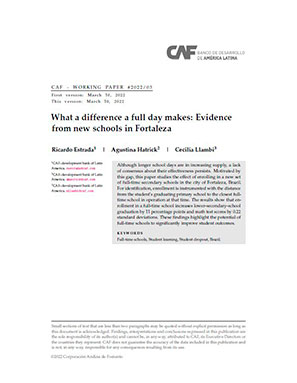Predicting Individual Wellbeing Through Test Scores: Evidence from a National Assessment in Mexico
Resumo
We construct two longitudinal datasets that record students’ test scores in a national standardized exam in Mexico and track students from the end of primary (Grade 6) to the end of lower (Grade 9) and upper (Grade 12) secondary school, then to university and labor market participation up to two years after graduation from upper secondary. Our results show that test scores are a strong predictor of future education and labor market outcomes. Using a large sample of twins in our data, we show that the relationship between Grade 6 test scores and future education outcomes goes beyond family background. Finally, we exploit the within-individual correlation between subject test scores and find evidence that this standardized assessment captures in a meaningful way the specific skills that it is designed to measure. These results show that, despite their limitations, large-scale standardized tests can capture skills that are important for future individual wellbeing.
Assunto
País / Región
Data
2018-05Cite esta publicação
Item que pertence à coleção

Items Relacionados
Rules vs. Discretion in Public Service: Teacher Hiring in Mexico
In this paper, I use a unique empirical setting that allows me to compare the performance of teachers hired in a discretionary process led by the teachers’ ...
What a difference a full day makes: Evidence from new schools in Fortaleza
Although longer school days are in increasing supply, a lack of consensus about their effectiveness persists. Motivated by this gap, this paper studies ...
Internet and Labor Income: Places and Activities in Colombia
Despite the literature in the richest countries about the positive correlation between Internet and income, there is still an open question about the ...




